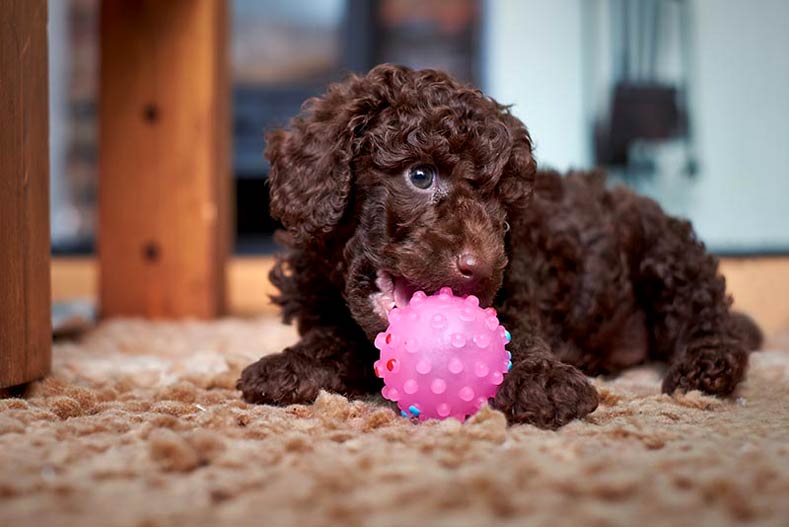
Ngan Dinh of Frisco, Texas, asks: My 3-1/2-month-old Toy Poodle likes to bite me, especially when he gets excited with a preferred toy or when he thinks I’m taking his toy away. (He also tries to bite and jump on people when he meets them because he gets overly excited.) Every time he bites me, I tell him “no bite” and tap his nose lightly with my finger. If he continues, then I’ll place him in “time-out” (in his crate) for 3-1/2 minutes and take him out again. Is this a good method to train him? And how long will it take for him to understand that biting is bad?
Puppies often get over stimulated when they are having a good time. They like to play using their mouths, but that doesn’t mean that you should tolerate being chewed up!
First, he has no idea what “no bite” means. And any nose tapping is just an invitation to play even more roughly. Time-outs in a crate are helpful, but remember that the crate should never be used as punishment. Be neutral, and give your dog a small treat for getting into the crate in these situations.
When playing with your puppy, always use toys that are big enough for you to guide into his mouth without getting your hand nipped. If he does get you, let him know, with a big “yipe!” that it really hurts. Cease all attention — completely ignore your dog for about 30 seconds. Don’t scold or yell at him (even negative attention is still attention). If after three tries, he is still biting you, put him in the crate to settle down.
Teach the puppy to “trade” toys with you. Start with a toy that isn’t his favorite. When he’s playing with it, offer a more desirable toy in exchange for it. This will teach him that letting you take a toy is a good thing. As he becomes more willing about this game, increase the value of the toys you are asking him to trade. You can also use high-value treats when making the swap. His favorite toys should be kept out of reach, only to be used when you are playing with him. This will make playtime with you extra special.
Make sure that your puppy is getting plenty of exercise and mental stimulation. If you teach him some basic obedience and a few tricks, you can ask for these behaviors when he’s getting carried away. It gives him a chance to earn praise and rewards by doing something you like, which is much more fun for the pup than just hearing “no!”
Our dogs are cherished members of our families, sharing our lives and providing unconditional love. But all dog owners know that our canine partners have different perspectives on life than our human family members.
If you have ever asked “Why does my dog do that?” then this feature is for you. The AKC GoodDog! Helpline training team will answer your questions on dogs’ behavior and offer training advice to help you and your dog have the best relationship possible. The AKC GoodDog! Helpline is a seven-day-a-week telephone support service staffed by professional dog trainers. For more information on the service and how to enroll go to www.akcgooddoghelpline.org.

